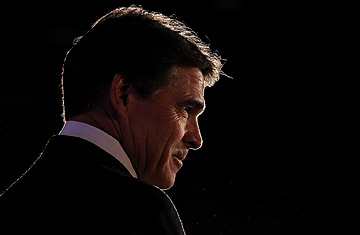
Texas Governor Rick Perry speaks during the 2011 Republican Leadership Conference in New Orleans on June 18, 2011
(2 of 2)
Republicans were an exotic breed when Perry grew up in small-town Texas. While national candidates like President Dwight Eisenhower enjoyed Texas support on Election Day, Texas Republicans were seeing their ranks grow very slowly in the decades after World War II. A young Perry had little interaction with the urban Republican salons in Dallas and Houston, where the Bush family's power base was centered. And while most of Perry's neighbors and constituents voted Republican at the top of the ticket, West Texans still favored conservative Democrats down ballot.
It is unlikely that today's Al Gore would consider voting for the 1988 Al Gore, and certainly Perry has seen fit to distance himself from Gore 2.0. "I've heard Al Gore talk about man-made global warming so much that I'm starting to think that his mouth is the leading source of all that supposedly deadly carbon dioxide," Perry said in 2007, according to the Austin American-Statesman. Two years later, Perry was asked about their diverged paths at a Dallas builders' meeting. "Did you get religion? Did he get religion? What has happened since then?" a member of the audience asked. "I certainly got religion," Perry said, according to the Dallas Morning News. "I think he's gone to hell."
Gore's loss in the 1988 campaign was a sign that southern Democrats were straddling an abyss. The longtime simmering division between liberal and conservative Texas Democrats had reached a boiling point in 1984 as both parties battled to replace the retiring U.S. Senator John Tower, a Texas GOP pioneer. The same year, Perry entered the political arena in a "referendum for the soul of the party" in Texas, according to longtime political observer Paul Burka, senior executive editor of Texas Monthly. Conservative Democratic Congressman Kent Hance, who had beaten a young George W. Bush in 1978, was battling liberal Democratic state senator Lloyd Doggett for the Democratic Senate nomination. The winner would take on the Republican nominee, Congressman Phil Gramm, himself a convert from the Democratic Party. Doggett beat Hance but lost to Gramm in the fall. In a prescient postelection analysis, Burka wrote in December 1984, "In the long run, ambitious young conservatives in Lubbock and Amarillo and Corpus Christi and Odessa and across Texas will be considering whether their future lies in the Democratic Party."
He might well have added ambitious young conservatives from Paint Creek in Haskell County, fresh to the game, like Rick Perry. After losing to Doggett, Hance switched parties in 1985, followed by a steady trickle of local and statehouse Democrats. But West Texas powerhouses like Congressman Charlie Stenholm and his fellow Southern Democrats, dubbed "boll weevils," hung on. (Boll weevil, a beetle that attacks cotton crops, was a derisive name, since replaced by the more appealing "blue dog" label.) Perry's neighbors liked having a powerful voice like Stenholm's in Washington on agricultural issues, and the young state representative, like his congressional counterparts, was not so fast to switch. Even when he did, he did not burn all his bridges. In 2006, when former Texas railroad commissioner Lena Guerrero, a longtime Democratic supporter of Governor Ann Richards, endorsed Perry, she recalled their freshmen days in the statehouse and praised his loyalty.
Finally, in 1989, Perry was persuaded by legendary political operative Karl Rove and others to switch to the GOP. The increasingly liberal Democratic hold on nominations at the top of the Texas ticket precluded Perry's further advancement in the party. Rove proposed that Perry run for agriculture commissioner against the firebrand liberal Democratic incumbent Jim Hightower, a journalist and champion of the progressive movement in Texas. (Hightower famously once said there is nothing in the middle of the road but yellow stripes and dead armadillos.) Given Perry's Texas A&M college past, his cotton-farming roots and his good looks, captured in a relaxed campaign portrait showing the ruggedly handsome Aggie in jeans and boots, the West Texas native was a natural. He won statewide office along with another Rove candidate, Hutchison, who became state treasurer. She hailed from the old urban Republican ranks; Perry was a parvenu out of the West.
The two would soon enough become bitter rivals. But at that moment, they were the crack in the dam. While Hutchison took a U.S. Senate seat, Perry ascended to the powerful lieutenant governor's spot in 1998 — a vital step in the presidential candidacy of Texas Governor George W. Bush, as Rove recalled in his memoir Courage and Consequence. Perry would protect Bush's flank at home from any charges that the governor's ambitions would leave Texas in Democratic hands — an unforgivable notion after the long GOP struggle to power. Once again, Perry hitched his wagon to a star, and in campaign literature, he described himself and Bush as "philosophical soulmates." And so, in 2000, the state was in solid Republican hands as Bush rode off to to take the presidency — after perhaps the most controversial vote in U.S. history, and at the expense of Perry's onetime partner Al Gore.
